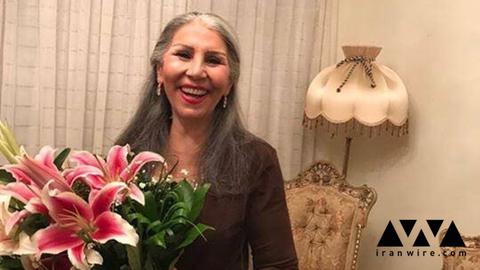Writer Bahiyyih Nakhjavani celebrates the inspirational poet and teacher Mahvash Sabet, who has been honored with the PEN Pinter Prize for International Writer of Courage. Poet Michael Longley, who shares the PEN Pinter Prize with Sabet, announced the award at a ceremony in London on October 10.
A woman walked out of Evin Prison in Tehran late one evening. Her face was pale from long confinement but her eyes shone bright. Her hair, shoulder length and dark when she first entered those doors, now reached her waist and was grey beneath her purple headscarf. There was no surprise in her glance, no eager anticipation. Just a quiet gratitude.
When I saw the press photo of Mahvash Sabet standing outside Evin that night, I was struck by that glance. We have never met, and I have only read her words in translation. We have only spoken once, during her brief furlough after eight years of unbroken detention. But though I had worked for months on her poems, nothing had prepared me for her nonchalant grace after so long in prison.
Mahvash Sabet was unjustly condemned to prison for her Baha’i beliefs, which are considered heretical by the mullahs. At her arrest, with six other colleagues known as the Yaran, she was carrying out the tasks of the democratically elected Baha’i institutions, disbanded when Khomeini came to power.
The largest religious minority in Iran, the Baha’i community has borne the brunt of persecution since the middle of the 19th century. Arbitrary arrests, brutal executions and tragic disappearances have been commonplace since the present regime came to power, but the systematic program of the Islamic Republic to uproot all trace of this peaceful faith has drawn worldwide condemnation.
Before her arrest, Mahvash, with a background in psychology and education, had assumed responsibility for the well being of Baha’i youth being harassed in schools and deprived of university education. She was a good communicator and known for the uplifting letters she wrote, the poems she shared with friends and family. She was visiting Baha’is in Mashhad when she was arrested.
Held without legal representation for more than a year, and finally condemned in a show trial, Mahvash received a cruelly long sentence in 2008, only recently commuted to 10 years. If her release comes before those of the other Yaran, it is because she was the first imprisoned. But if journalists were waiting to see her on the night of her release, it may also have been because her words were freed before she was.
Many have entered Evin Prison over the past four decades. Many, among them Baha’is, have never come out. And many who still remain have grown bitter eating the “black camphor bread” of that place. But Mahvash escaped the bitterness through poetry. In fact, the reason I knew of her, apart from the privilege of sharing her beliefs, was because of those poems.
About four years ago, a handful of Mahvash’s poems reached us abroad. Like many Persians, versifying was in her blood but she had never considered herself a poet. Her words made me weep — not just because of the terrible conditions she described, but because of her compassion. Her poems were dedicated to others. She was scribbling on paper napkins to bear witness to the suffering of others. She was piecing together the sorrows of others.
She was also writing of hope inside the prison, looking for any signs she could find, a scrap of blue sky, a thistle in the pavement, to keep faith behind those walls. Her poems recorded the heroism of maintaining joy in those impossible conditions. She was not wallowing in grief; she had no illusions about herself. She was simply trying to lift her spirits and those of others as high as she could above those walls.
I longed to help her poems reach the world.
From 2011 on, with the help of others, I adapted Mahvash’s verse into English. Prison Poems, first published in the UK in 2013, has since been widely distributed in the US, in Canada and in Australia. It has also appeared in French, German and Italian editions as well as the original Persian. Earlier this year, a Norwegian publication coincided with a performance of Lasse Thoresen’s composition, based on the poems, at the International Church Music Festival in Oslo.
Indeed, since she was chosen by PEN International as one of the five "Imprisoned Writers of the Day" on November 15, 2014, Mahvash has become internationally known. Despite being behind bars, her poems have reached beyond them. They are a vindication of the human spirit, a proof that the life of the mind and the vigor of the soul can never be confined.
So perhaps there is something symbolic about Mahvash’s refusal to cut her hair in Evin. Perhaps those flowing locks of hers, grown long and grey behind its walls, are emblematic of her unrestrained spiritual freedom. When I looked at that photo, taken at the moment of her release, and saw that quiet smile and the long swathe of elegant hair beneath her purple scarf, I realized that this woman had no need of translation.
She has been free all her life.
Bahiyyih Nakhjavani is a writer living in France. Born in Iran, raised in Uganda, and educated in the UK and the United States, she has taught literature in many countries, is the author of non-fiction as well as novels, and has adapted Persian poetry into English. Her latest work Us&Them, is a satire about the Iranian diaspora.
The 2017 PEN Pinter Prize was awarded to poet Michael Longley in June. He named Mahvash Sabet as the 2017 International Writer of Courage.
English PEN, which champions free expression and writers' freedoms, set up the prize in 2009 in memory of Nobel laureate playwright Harold Pinter. Each year, the prize is shared with an international writer who has demonstrated tremendous courage to express their beliefs and ideas, often putting themselves at personal risk.
Read more:
An Exclusive Interview With the Freed Baha'i Leader
visit the accountability section
In this section of Iran Wire, you can contact the officials and launch your campaign for various problems





















comments